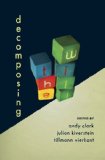There is growing evidence from the science of human behavior that our everyday, folk understanding of ourselves as conscious, rational, responsible agents may be radically mistaken. The science, some argue, recommends a view of conscious agency as merely epiphenomenal: an impotent accompaniment to the whirring unconscious machinery (the inner zombie) that prepares, decides and causes our behavior. The new essays in this volume display and explore this radical claim, revisiting the folk concept of the responsible agent after abandoning the image of a central executive, and “decomposing” the notion of the conscious will into multiple interlocking aspects and functions.
Part 1 of this volume provides an overview of the scientific research that has been taken to support “the zombie challenge.” In part 2, contributors explore the phenomenology of agency and what it is like to be the author of one’s own actions. Part 3 then explores different strategies for using the science and phenomenology of human agency to respond to the zombie challenge.
Questions explored include: what distinguishes automatic behavior and voluntary action? What, if anything, does consciousness contribute to the voluntary control of behavior? What does the science of human behavior really tell us about the nature of self-control?
Table of Contents
1. Decomposing the WIll: Meeting the Zombie Challenge , Tillmann Vierkant, Julian Kiverstein, and Andy Clark
PART ONE The Zombie Challenge
2. The Neuroscience of Volition , Adina L. Roskies
3. Beyond Libet: Long-term Prediction of Free Choices from Neuroimaging Signals , John-Dylan Haynes
4. Vetoing and Consciousness , Alfred R. Mele
5. From Determinism to Resignation; and How to Stop It , Richard Holton
PART TWO The Sense of Agency
6. From the Fact to the Sense of Agency , Manos Tsakiris and Aikaterini Fotopoulou
7. Ambiguity in the Sense of Agency , Shaun Gallagher
8. There’s Nothing Life Being Free: Default Dispositions, Judgments of Freedom, and the Phenomenology of Coercion , Fabio Paglieri
9. Agency as a Marker of Consciousness , Tim Bayne
PART THREE The Function of Conscious Control: Conflict Resolution, Emotion, and Mental Actions
10. Voluntary Action and the Three Forms of Binding in the Brain , Ezequiel Morsella, Tara C. Dennehy, and John A. Bargh
11. Emotion Regulation and Free Will , Nico H. Frijda
12. Action Control by Implementation Intentions: The Role of Discrete Emotions , Sam J. Maglio, Peter M. Gollwitzer, and Gabriele Oettingen
13. Mental Action and the Threat of Automaticity , Wayne Wu
14. Mental Acts as Natural Kinds , Jo^”elle Proust
PART FOUR Decomposed Accounts of the Will
15. Managerial Control and Free Mental Agency , Tillmann Vierkant
16. Recomposing the Will: Distributed Motivation and Computer-Mediated Extrospection , Lars Hall, Petter Johansson, and David de Leon
17. Situationism and Moral Responsibility: Free Will in Fragments , Manuel Vargas






